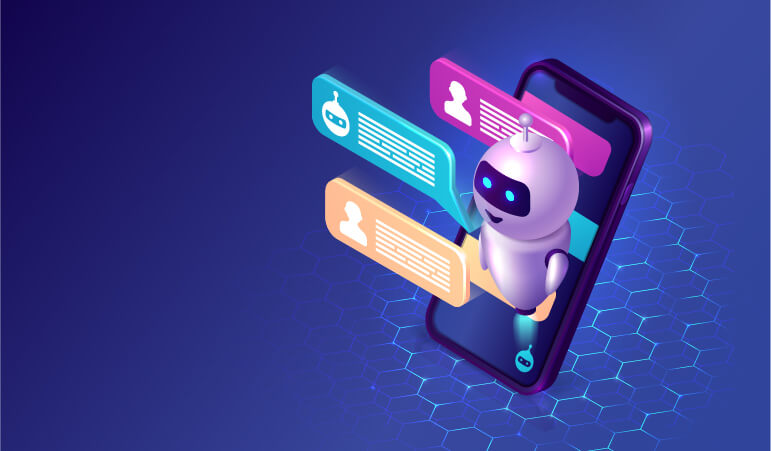
Good customer service is an integral element to the success of any business. With the rise in mobile devices over the last decade, chatbots are increasingly becoming a popular option to interact with users. The popularity of chatbots and their adoption is rapidly increasing as they enable businesses to provide real-time customer service in many e-commerce settings.
Let us explore the rise of Artificial Intelligence (AI), Natural Language Processing (NLP), and chatbots for customer service.
What is a Chatbot?
A chatbot is an AI-based software that interacts with a user through either text or audio. Chatbots were first contemplated by Alan Turing, an English computer scientist. In 1950, he authored the paper “Computer Machinery and Intelligence,” in which he outlined the “Turing artificial intelligence test,” compelling his students and colleagues to question whether machines can think.
Inspired by the Turing test, Joseph Weizenbaum created ELIZA in 1966, setting the foundation for the structure of chatbots used today, such as pre-programmed responses, keywords, and specific phrases. Soon after this, other bots followed. In 1995, a language-processing bot gained popularity, followed by Smarterchild in 2001, which is considered as a precursor of Siri and S Voice.
The last decade saw chatbots as an integral element of tech companies. Every major tech company has its chatbots; IBM has Watson, Apple has Siri, Google has Google Now, Samsung has S Voice, Amazon has Alexa, Microsoft has Cortana, and Facebook has Portal (backed by Alexa). Facebook further encouraged the development of AI-enabled customer service when, in 2016, it launched a messaging platform that allowed businesses to create bots that converse with their followers. With the rise in the popularity of chatbots, almost every company has integrated chatbots on their websites.
Impact of AI-based Customer Service
According to research conducted by Forrester, messaging is the number one customer service channel preferred by the customers in the US, South Korea, India, and Singapore. So it comes as no surprise that a significant portion of businesses, both big and small, are incorporating some form of message functionality into their valuable CRM system.
Let’s delve into the top-cited benefits that come from AI-based customer service.
- 24/7 Customer Service
AI-powered chatbots can provide customer service to many people 24/7 without the need for an actual human employee. Because of this, chatbots are increasingly being used as the front-line for customer engagement.
- Instant Response
With the fast-paced world of online knowledge consumption, consumers are interested in immediate responses before they get bored and move on to the next business. A study on chatbot user experience notes that 40 percent of people do not care if they get help from a human or a chatbot, as long as they get quick support for their queries.
- Improved Customer Satisfaction
AI-enabled chatbots can proactively start conversations with consumers, provide relevant information, and help with queries and touchpoints throughout the customer lifecycle. This enables customers to get the help they require, when they want it, without having to wait on hold for an employee to become available. This eventually leads to better customer satisfaction and improved time to resolution.
- More Productivity
In addition to answering queries, it can also transfer a caller to a customer service agent if human help is inevitable. This leads to increased productivity and lets the customer service agents focus on more complex cases instead of dealing with mundane and readily answered questions.
Chatbots and its Impact on Businesses
Customers are not the only ones that benefit from AI-enabled chatbots. According to Chatbots Magazine, by incorporating AI-based customer support, businesses have saved up to 30% in cost as it allows prompt resolution of basic customer queries. Juniper Research mentioned that in 2017, chatbots enabled $20 billion in business savings. Research by PWC showed that 34% of business executives express that chatbots reduced their workload, increased productivity, and allowed them to focus more on creating new business ideas.
The advantages of chatbots on business productivity, reduced costs, and increased sales are evident. With more sophistication in AI, chatbots are sure to become more and more evolved.
If your business is looking for conversational AI or chatbots for exceptional customer service, reach out to us at [email protected]
For further information, visit our AI Solutions page
